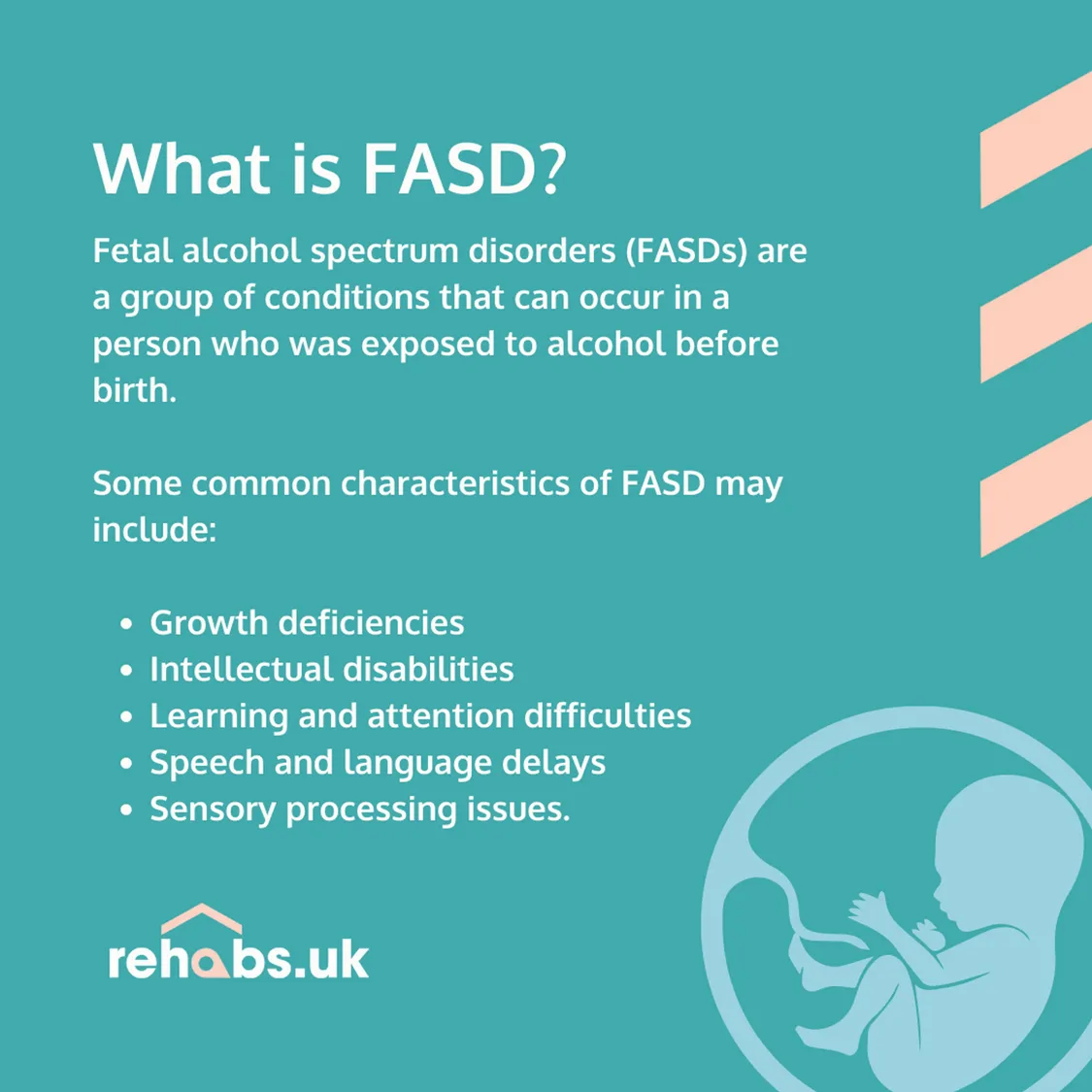18 Dec 2023
What is FASD?
FASD stands for Foetal Alcohol Spectrum Disorder. It is a group of conditions that can occur in individuals whose mothers consumed alcohol during pregnancy. The consumption of alcohol during pregnancy can cause various physical, mental, behavioural, and cognitive impairments in the developing foetus, leading to FASD.
How do people get FASD?
People can get FASD when their mothers consume alcohol during pregnancy. Alcohol crosses the placenta and can interfere with the normal development of the baby's brain and other organs. The risk and severity of FASD increase with higher levels and frequency of alcohol consumption during pregnancy. It is important to note that there is no known safe amount of alcohol to consume during pregnancy.
How does FASD affect individuals?
Fetal Alcohol Spectrum Disorder (FASD) can have a wide range of effects on individuals, as it impacts the developing brain and body. The effects of FASD can vary in severity and can affect individuals differently. Some common effects of FASD include:
- Physical effects: Individuals with FASD may have distinct physical features, such as a small head size, flattened midface, thin upper lip, and smooth philtrum (the area between the upper lip and nose). Growth deficiencies, including lower weight and height, are also common. Other physical effects may include heart defects, vision or hearing problems, and skeletal abnormalities.
- Cognitive impairments: FASD can lead to intellectual disabilities and cognitive impairments. Individuals may experience difficulties with memory, attention, problem-solving, and abstract thinking. Learning disabilities and delays in language development, such as speech and comprehension difficulties, are also common.
- Behavioural and social challenges: Individuals with FASD often exhibit behavioural and social challenges. They may struggle with impulse control, have difficulties understanding social cues, exhibit hyperactivity or impulsivity, and experience challenges with self-regulation. These difficulties can result in trouble with academic performance, social interactions, and forming and maintaining relationships.
- Sensory issues: Sensory processing difficulties are common among individuals with FASD. They may be sensitive or intolerant to certain sensory stimuli, such as loud noises, bright lights, or certain textures. These sensitivities can affect their daily functioning and may contribute to behavioural challenges.
- Mental health issues: Individuals with FASD are at a higher risk of experiencing mental health issues, such as anxiety, depression, and attention deficit hyperactivity disorder (ADHD). These co-occurring conditions can further complicate the challenges faced by individuals with FASD and require appropriate diagnosis and treatment.
Chloe Lambert from Oxley was diagnosed with foetal alcohol spectrum disorder (FASD) when she was aged seven.
In a recent article she explains the challenges she faces in day-to-day life including the difficulty to get a job.
She states: "People must be made aware of different types of hidden disabilities. Employers should consider what people with hidden disabilities can do to the best of their ability rather than focusing on what they can’t do."
She told Rehabs UK:
"NO amount of alcohol is safe to drink whilst in pregnancy.”
“I experience, struggles with day-to-day tasks. Like cooking, crossing roads. Not Being aware of dangerous things or citations. Talking to strangers doing things I should do, like go places people tell me not to go or where it’s dangerous.” In a more recent article with Birmingham Live, she said: “A lot of jobs require skills that I don’t have like maths or working with money. I wish employers would think more about what people like me can do, rather than what we can’t.
“Just because I don’t have certain skills, doesn’t mean I can’t do other things. I’m very good with people, I have good social and communication skills. I enjoy IT and working with computers too. I just want an employer to take a chance on me.”

How to get diagnosed?
Diagnosing FASD can be a complex process that involves a multidisciplinary approach. Medical professionals, such as paediatricians, psychologists, and other specialists, typically evaluate the individual's physical features, growth patterns, and developmental milestones. They also assess cognitive and behavioural functioning through various tests and interviews with the individual and their caregivers. Additionally, obtaining a thorough history of the mother's alcohol consumption during pregnancy is crucial for an accurate diagnosis.
Diagnosis may involve a range of assessments, including physical examinations, neurodevelopmental evaluations, psychological assessments, and behavioural observations. The specific diagnostic criteria and processes may vary between countries and healthcare providers. It's important to consult with a healthcare professional experienced in diagnosing and treating FASD for a comprehensive evaluation and appropriate diagnosis.
What more can be done to help support those with FASD?
Supporting individuals with Fetal Alcohol Spectrum Disorder (FASD) involves a comprehensive and individualised approach. Here are some strategies and interventions that can help:
- Early intervention: Early identification and intervention are crucial for individuals with FASD. Early intervention programmes, such as speech therapy, occupational therapy, and behavioural interventions, can help address developmental delays and improve functional skills.
- Education and awareness: Raising awareness about FASD among parents, caregivers, educators, and the general public is essential. Providing accurate information about the disorder can help reduce stigma and promote understanding and empathy.
- Individualised educational plans: Developing individualised educational plans (IEPs) that address the specific learning needs of individuals with FASD is important. These plans can include accommodations, modifications, and specialised support services within educational settings.
- Behavioural interventions: Behaviour management strategies, such as structured environments, visual schedules, and positive behaviour supports, can be effective in managing challenging behaviours associated with FASD. Consistency, routine, and clear expectations are crucial.
- Social skills training: Teaching social skills and promoting social interaction can help individuals with FASD develop positive relationships and improve their social functioning. Social skills groups and targeted interventions can be beneficial in this regard.
- Supportive home environment: Creating a supportive and nurturing home environment is essential. Providing consistent routines, clear rules and expectations, and a calm and structured atmosphere can help individuals with FASD thrive.
- Community support and resources: Connecting individuals with FASD and their families to support groups, community resources, and specialised services can provide valuable assistance. These resources may include FASD clinics, parent support groups, counselling services, and respite care.
- Transition planning: As individuals with FASD transition into adulthood, it is important to develop transition plans that address their specific needs. This may involve vocational training, independent living skills development, and ongoing support services.
- Collaborative approach: FASD is a complex disorder, and a collaborative approach involving healthcare professionals, educators, therapists, and caregivers is crucial. Regular communication and coordination between these stakeholders can ensure consistent support and intervention strategies.
- Continued research and advocacy: Supporting ongoing research into FASD and advocating for policies and programs that address the needs of individuals with FASD are important for long-term improvements in support and care.
Remember, each individual with FASD is unique, and interventions should be tailored to their specific strengths and challenges. Consulting with professionals experienced in FASD and accessing appropriate resources and services can greatly enhance the support provided to individuals with FASD and their families.
